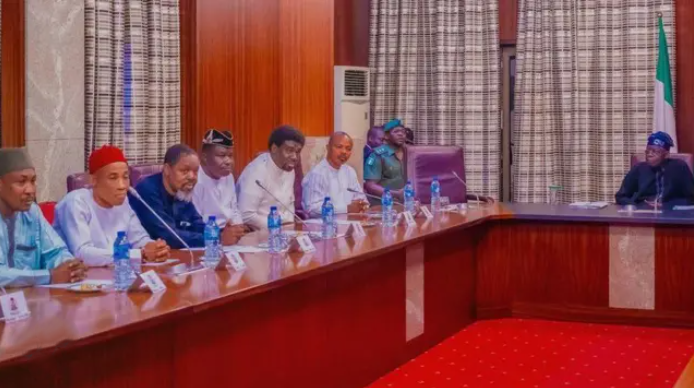By Joke Kujenya
PRESIDENT BOLA Tinubu has emphasized the need for improved welfare and wages for Nigerian workers.
He met with the leaders of the Nigeria Labour Congress (NLC) and the Trade Union Congress (TUC) in Abuja.
Tinubu expressed concern for workers’ well-being and said his administration prioritizes their concerns.
“I pay attention to everything. A happy worker is productive, and society depends on this productivity,” Tinubu said.
He called for realistic expectations regarding the minimum wage.
“We must adjust wages sensibly. Why every five years? Why not two or three? We need a pragmatic approach.”
Responding, NLC President Joe Ajaero emphasized the need for a higher minimum wage.
“We need to balance between living wage and minimum wage. Things are tough for Nigerians, and workers in general,” Ajaero said.
He also congratulated Tinubu on the Supreme Court ruling affirming local government financial autonomy. “We have protested for this autonomy. We commend you for the progress.”
TUC President Festus Osifo discussed the impact of inflation on the naira.
He noted that government measures to address food and transportation costs must take effect soon.
“Compressed Natural Gas buses will reduce transportation costs. Suspending duty on certain food imports will lower food prices if implemented properly,” Osifo said.
Further talks with labour leaders were adjourned for broader consultation.
But the Nigeria Labour Congress reacted strongly, demanding a practical minimum wage.
The NLC criticized Tinubu’s statement during a meeting with governors and National Assembly members, where he suggested the government could only pay what the country could afford.
NLC spokesperson Benson Upah called this a contradiction of Tinubu’s promise to pay a living wage.
Disagreements continue between the government, labour, and the Organised Private Sector over the new minimum wage.
Tinubu earlier announced a consensus on the minimum wage in his broadcast marking Nigeria’s 25th Democracy Day.
He said an executive bill would soon be sent to formalize the new wage.
The Organized Labour disputed this claim, stating no agreement was reached.
Acting NLC President, Adewale Adeyanju, said the demand remains N250,000.
“We haven’t been given reasons to change this position. We’re surprised by the President’s submission,” Adeyanju said.
State governors had recently opposed the proposed minimum wage, arguing it would affect their ability to deliver critical projects.





